For this third and final section of my interview with Leonard Retel Helmrich, I’ve assembled the parts of our conversation in which Leonard talks about the culture of Katwijk, the city where the fishermen seen in RAW HERRING reside, as well as the political and environmental factors on what the film shows.
A few bits to consider: About a week ago, RAW HERRING made its television debut on Dutch tv. New Yorkers in particular will want to know that excerpts of the film will be shown at The Russ & Daughters Herring Celebration on June 18.
On the geography of Katwijk (the city where the fishermen seen in RAW HERRING reside)
This is one of the few fishing communities in the Netherlands. There are not so many. All of them are near to the sea. But not every city near to the city is a fishing community. They were really on the beach. The Dutch were for a long time good fishers because they managed to make boats that could get pulled on land instead of having a harbor. They didn’t have a harbor. To make a harbor there was very hard in their time because they have the sea really pounding on the coast. But still they wanted to fish. They managed to have quite big boats, but they were flat and therefore they could pull them with horses on the shore using tree trunks and horses. That’s the way they were doing it in the time that Grierson was making Drifters. But now they have these bigger ships and they go from the harbor to another city nearby. They use them to go high up to the north...where the sun almost never sets. So it’s light also at night.
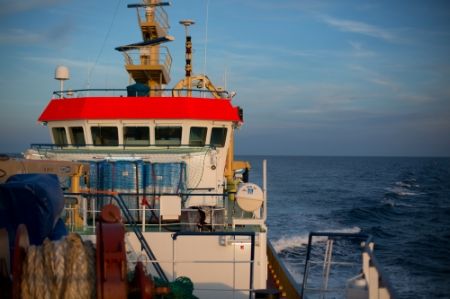
The crew of the ship
To encourage their children to become fishers, they put them on the boat. Because they want to teach the children. Mostly after elementary school. before they even go to high school. Around becoming a teenager around 15 or 16. There was one who was even 11.
On the way raw herring is being eaten in the film
It’s common throughout Holland. It’s really all over Holland they eat herring raw, and in this way: Dangle it and let it slide in your throat. So I filmed a lot of it, but only used the funniest ones: An old man pushing it in his mouth, a little boy, and someone who was in a wheelchair and he was being fed it by somebody else....
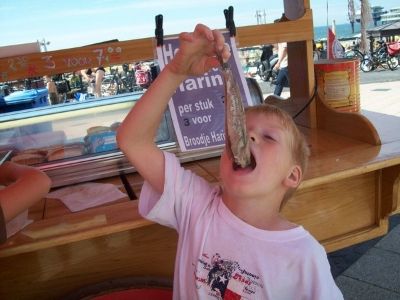

The crew of the ship
Well, one way or another, the people from the village of Katwijk, they grow up with fishing so many young people really want to become fisherman. It’s a kind of career and still a tradition there. In this crew, there were only three people from, say, the 20 people on the ship, who were not from Katwijk.
To encourage their children to become fishers, they put them on the boat. Because they want to teach the children. Mostly after elementary school. before they even go to high school. Around becoming a teenager around 15 or 16. There was one who was even 11.
On the way raw herring is being eaten in the film
It’s common throughout Holland. It’s really all over Holland they eat herring raw, and in this way: Dangle it and let it slide in your throat. So I filmed a lot of it, but only used the funniest ones: An old man pushing it in his mouth, a little boy, and someone who was in a wheelchair and he was being fed it by somebody else....

Is scarcity of herring a major concern?
Why the fish were dumped
It was full. they caught too much. They could have known because they had radars and everything. So they know how much space they had. They just wanted to have a really full catch. And still they damaged the fish and they released them…It’s crazy. They released the fish that were already dead.
Then, if they’re dead or if it’s the wrong catch then it’s all very much a waste. And the reason why they do that is, it because in Europe there is a quota for every country on different kinds of fish they can catch during certain times of year. So, in June it’s the herring and not mackerel. When you still catch mackerel and you bring it to the shore they fine you. That’s the rule. That’s what the Dutch do.
In Norway, they have the same thing. You’re not allowed to, but they take the mackerel when it’s still being processed and they cut it from the quota of mackerel. So that’s a better system. It’s much more honest. Instead of fining it because what that does is they have to dump it in the sea. It’s crazy.
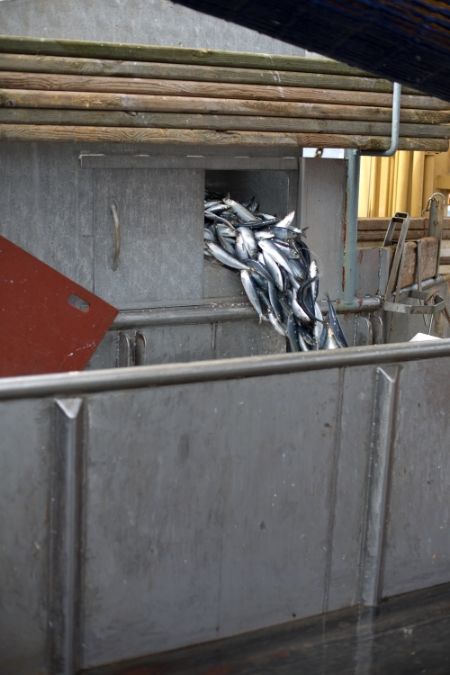
On dealing with environmental themes in the future
But as for other films, the only thing that I’m researching now is a project that the Dutch want to start. An organization wants to build a windmill on an island in Indonesia. I want to see what’s going on there. The good thing is you have two cultures interacting with each other: people from Holland, people from Indonesia. And how they finally work together to reach a common goal. And how they interact, that will always be a story.
------------------------
Yeah, definitely. At the beginning you could see already when they are searching for fish, my captain says ‘in the old days you could fish at 75 (degrees) and even lower. Now you have to go even higher up north. At the very end when they dump the fish, I could see why. Because next year there will be even less fish. It really shocked me when I saw it.
Why the fish were dumped
It was full. they caught too much. They could have known because they had radars and everything. So they know how much space they had. They just wanted to have a really full catch. And still they damaged the fish and they released them…It’s crazy. They released the fish that were already dead.
On the economics of herring fishing
Most of the herring gets imported from Norway, Sweden, and Denmark. But these fishermen, they actually fish in a more honest way. What they do is, when they see fish on the radar, they have a big net, like a curtain, they hang it in the sea. And they float around and they manage to close the net from underneath and let the fish come up slowly, and when fish are coming near to the surface, they extract samples from them and see if it’s fat enough and if it’s really herring because you cannot see if it’s herring or mackerel on the radar. Because if it’s not good enough, they can open the net again and release them and they’re still alive. But the Dutch, they see the fish, they see there is fish, so they scoop it up in a big net. Not slowly but very fast; it has to be fast because it’s a very big net. And then the fish are mostly already dead, or dying, because they go to the surface too quickly. Because when you do it too quickly they have all these things that can explode. Sometimes you see the fish with their mouths open and they want to throw the intestines out. It’s horrible.
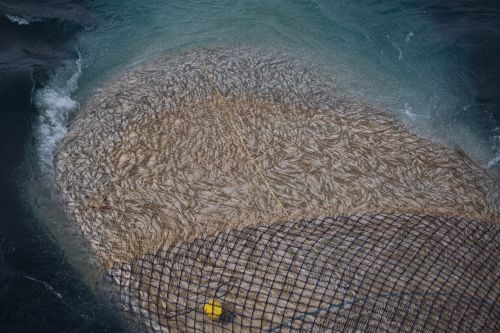
Most of the herring gets imported from Norway, Sweden, and Denmark. But these fishermen, they actually fish in a more honest way. What they do is, when they see fish on the radar, they have a big net, like a curtain, they hang it in the sea. And they float around and they manage to close the net from underneath and let the fish come up slowly, and when fish are coming near to the surface, they extract samples from them and see if it’s fat enough and if it’s really herring because you cannot see if it’s herring or mackerel on the radar. Because if it’s not good enough, they can open the net again and release them and they’re still alive. But the Dutch, they see the fish, they see there is fish, so they scoop it up in a big net. Not slowly but very fast; it has to be fast because it’s a very big net. And then the fish are mostly already dead, or dying, because they go to the surface too quickly. Because when you do it too quickly they have all these things that can explode. Sometimes you see the fish with their mouths open and they want to throw the intestines out. It’s horrible.

Then, if they’re dead or if it’s the wrong catch then it’s all very much a waste. And the reason why they do that is, it because in Europe there is a quota for every country on different kinds of fish they can catch during certain times of year. So, in June it’s the herring and not mackerel. When you still catch mackerel and you bring it to the shore they fine you. That’s the rule. That’s what the Dutch do.
In Norway, they have the same thing. You’re not allowed to, but they take the mackerel when it’s still being processed and they cut it from the quota of mackerel. So that’s a better system. It’s much more honest. Instead of fining it because what that does is they have to dump it in the sea. It’s crazy.

The effects of a decreasing herring population on jobs
The thing is that they are ruining their own jobs by doing it this way, the way that they do now. That’s why I end the film with these birds diving for the fish in a very empty ocean. That’s my message actually. First, I was very angry about it and we wanted to make an issue of it and go into the politics of it. But then I thought I like the people actually, I like these fishermen, and if I just show what I’ve seen, everybody can draw their own conclusion. So I have to show it in the way I see it. I see it also as a part of nature actually. We are all animals, we’re just primates actually. So when we do things like that it’s, for me, more a symbol, not only for fishing, but how we deal with nature. The only thing that we do is ruin our environment. So at the very end we as mankind can’t survive anymore because of the way we treat nature. We are a part of it.
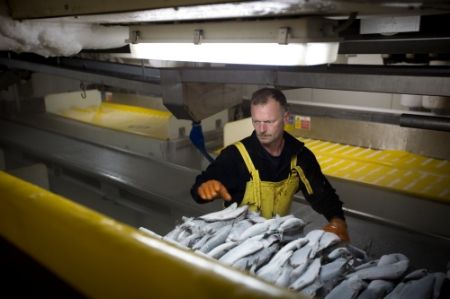

On dealing with environmental themes in the future
If it comes up, yes. The whole thing about the herring, at first I didn’t even think of making a more environmental issue film. And during the whole film you don’t have this feeling. Only at the very end you conclude, you understand...i hope it will work like that...that people think and see that the oceans are getting to be less and less and will understand and remember how hard it was for them to catch fish in the beginning of the film and think how related things are. I hope the environmental issue comes across in that way, through an emotional layer.
But as for other films, the only thing that I’m researching now is a project that the Dutch want to start. An organization wants to build a windmill on an island in Indonesia. I want to see what’s going on there. The good thing is you have two cultures interacting with each other: people from Holland, people from Indonesia. And how they finally work together to reach a common goal. And how they interact, that will always be a story.
------------------------
Me on twitter = @mondocurry
No comments:
Post a Comment